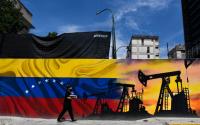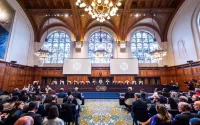February 6 2011
by Kareem Fahim
As Egyptians turned their anger on symbols of the state late last month, torching police stations along with the headquarters of President Hosni Mubarak’s ruling party, they reserved a special hatred for a garish building with black tinted windows in an upscale neighborhood, setting fire to it three times.
It belongs to a steel tycoon and ruling party insider named Ahmed Ezz, a close friend and confidante of Mr. Mubarak’s son Gamal. For many years, Mr. Ezz has represented the intersection of money, politics and power, controlling two-thirds of the steel market, leading the budget committee as a member of Parliament and serving as an officer and loyal lieutenant in the governing party. Public resentment at the wealth acquired by the politically powerful helped propel the uprising already reshaping the contours of power along the Nile.
Mr. Ezz’s world has come undone. He is treated as a liability by an old guard intent on saving itself from fed-up and furious protesters. He is under investigation on suspicion of corruption. His assets have been frozen and his right to travel taken away. He has denied accusations of corruption in the past, and his location was not known Sunday. Now his name is part of the derisive chants in Tahrir Square, a symbol of all that was wrong with Mr. Mubarak’s government.
“Ahmed Ezz sucks the blood of the people,” said Osama Mohamed Afifi, a student who joined the protesters in the square on Sunday. “He is the only man who can sell steel in all of Egypt, and he sells it for much more than if we could buy steel from someone else like China.”
Hosni Mubarak’s Egypt has long functioned as a state where wealth bought political power and political power bought great wealth. While hard facts are difficult to come by, Egyptians watching the rise of a moneyed class widely believe that self-dealing, crony capitalism and corruption are endemic, represented in the public eye by a group of rich businessmen aligned with Gamal Mubarak, the president’s son, as well as key government ministers and governing party members.
“The people around Gamal became the wealthiest group in the country,” said Hala Mustafa, a political scientist who quit the ruling party years ago, saying it was not committed to political reform. “They monopolized everything.”
While Egypt’s gross domestic product grew, so did the percentage of the population that was poor. Rumors of kickbacks and corruption swirled. There have been multibillion-dollar estimates of the wealth of the president or his family, but experts say those are unsubstantiated guesses.
A 2006 cable obtained by WikiLeaks described a 274-page report by an opposition political group detailing accusations of corruption by the president’s wife, Suzanne, as well as Gamal Mubarak and his brother, Alaa, a businessman. The cable, from the American ambassador in Cairo, Francis J. Ricciardone, noted that the accusations were unproven but called the report evidence of growing public anger.
“Egyptians are becoming increasingly vocal about sensitive issues despite the possible government backlash,” he noted.
The Mubaraks owned a five-story townhouse on 28 Wilton Place in the upscale Knightsbridge district of London, which has served as a base for Mrs. Mubarak and a home for Gamal Mubarak when he was working in London as an investment banker. A local property agent said townhouses in the area had sold in recent years for $10 million to $16 million.
Last week, a woman answering the front door of No. 28 said the Mubaraks had sold the townhouse, but property agents said there was no record of a sale, and neighbors said they had seen Gamal Mubarak and his family entering the house several times recently.
Mr. Ezz, in his tight Italian suits, became the best known and most reviled member of the group around Gamal Mubarak.
His father was a steel trader and his mother owned land in Gaza. Mr. Ezz grew up wealthy but not rich, according to Ali Moussa, a leading businessman and a member of the ruling party who has known Mr. Ezz since he was a child. The family steel business grew in the early 1990s, during a period of economic changes when the Egyptian government, at the behest of the International Monetary Fund, carried out a radical restructuring of the country’s economy.
On paper, the changes transformed an almost entirely state-controlled economic system to a predominantly free-market one. In practice, though, a form of crony capitalism emerged, according to Egyptian and foreign experts. State-controlled banks acted as kingmakers, extending loans to families who supported the government but denying credit to viable businesspeople who lacked the right political pedigree.
Ahmed El Naggar, director of the economic studies unit at Al-Ahram Center for Political and Strategic Studies, said government officials sold state-owned land to politically connected families for low prices. They also allowed foreign conglomerates to buy state-owned companies for small amounts. In exchange, he said, they received kickbacks.
At the same time, the government required foreign investors to form joint ventures with Egyptian firms. Families with close ties to the governing party formed the Egyptian half of the lucrative joint ventures.
“It’s quite clear that entire domains in the economy were dominated by a few people,” said Eberhard Kienle, chairman of the Center for Near and Middle Eastern Studies at the School of Oriental and African Studies in London. “If you talk to the smaller business dealer, they feel they can’t rise to the top. Markets are being allocated politically.”
Exacerbating tensions, Egypt’s oligarchs flaunted their wealth. They built grandiose homes in the desert outside Cairo and along the country’s coasts. They drove brand-new Mercedes-Benzes down derelict Cairo streets with police escorts.
As the economy was privatized, Mr. Ezz’s family bought a public-sector steel company, according to Tarek H. Selim, an associate professor of economics at the American University in Cairo.
At the same time, Mr. Ezz took on a more active role in public life, becoming vice chairman of a national trade federation, the head of one of the country’s industrial cities and a member of Parliament.
At about the same time, Gamal Mubarak was becoming active in his father’s party, and looking to inject it with fresh blood, Mr. Moussa said. By 2002, when Gamal Mubarak took control of the party’s policy-making committee, Mr. Ezz was a rising star in the party, and his steel company was making him incredibly rich.
By 2003, Ezz Steel controlled two-thirds of the Egyptian market, Professor Selim said. Over the next few years, as Mr. Ezz took on important responsibilities in the governing party, allegations mounted that he was using his position to enrich himself and defend his near-monopoly on the steel business. Professor Selim said complaints brought against Mr. Ezz with the Egyptian Competition Authority were dismissed, in large part because of the high threshold for such complaints under the law.
“The case against him was not strong,” said Professor Selim, who was an economic adviser to the authority. He added: “There should have been more aggressive monitoring of his activities. I think he should have been fined.”
Even without formal sanctions, the public took a dim view of Mr. Ezz’s business dealings, which were faulted — rightly or wrongly — as raising construction costs in Egypt, as cement prices rose along with steel prices. Mr. Ezz’s continued ascent in the National Democratic Party worsened that perception.
In November, Mr. Ezz presided over the party’s parliamentary election campaign, an effort that was seen as a ruthless success: amid widespread charges of intimidation, violence and election rigging, opposition parties won only a sprinkling of seats. Afterward, Mr. Ezz bragged about the results in the press.
Mr. Moussa, the ruling party member, said that even party members thought Mr. Ezz had gone too far.
“He convinced everyone that we had to dominate the election,” Mr. Moussa said. “The cabinet could have defended itself. A friend said to me: The stupid part is we had the opposition inside the Parliament under a covered roof. He took the opposition into the street.”
Political analysts said that the focus of investigations now, including Mr. Ezz, is at best selective, intended not to punish corruption, but to address public grievances without actually changing the system. Casting out Mr. Ezz, who had tense relations with the old guard in the party, appears part of a strategy on many fronts to try to survive, analysts said.
Prosecutors also imposed a travel ban and froze the assets of Rachid Mohamed Rachid, the former minister of investment and trade who had for years been hailed as an effective official committed to opening up Egypt’s fossilized, centrally controlled economy. The accusations surfaced when he was in Dubai. Reached in Dubai by Reuters on Sunday, Mr. Rachid declined to comment. He said he planned to return to Egypt.
“The old guard is focused on Ahmed Ezz as being incredibly corrupt,” said Issandr El Amrani, an independent journalist and blogger who has closely followed the connections between money, power and politics in his writing. “Is he more corrupt than security people, than generals, than ministers?”
Mr. Amrani pointed to half a dozen influential officials who, while he said he had no evidence they were involved in corruption, did enhance the public perception of an unfair playing field. Most had some connection to the National Democratic Party, which itself was an institution whose power stemmed from its ability to control and influence the affairs of the state.
Among those in this circle, Mr. Amrani said, were Ibrahim Kamal, a senior member of the party who also runs an industrial group; the former minister of agriculture, who he said was a major textile producer; a ceramics businessman, Muhammad Abul Einen; a former housing minister, Ahmed al-Maghrabi; and his cousin, the former minister of transportation, Mohamed Mansour. While in office they also continued to own a large investment and development company.
Hisham Talaat Mustafa, now serving a 15-year prison term for paying to have a former police officer kill his former lover, a Lebanese pop star, Suzanne Tammim, was also a member of Gamal Mubarak’s inner circle. He was spared the death penalty after a court threw it out, fueling public resentments about a double standard.
Now, Mr. Ezz and other officials are “are being offered up to the public” as scapegoats, said Samer Shehata, an assistant professor of Arab politics at Georgetown who has interviewed Mr. Ezz. “The N.D.P. is a group of individual and financial interests masquerading as a political organization,” he added. “There’s little difference between Ahmed Ezz and Gamal Mubarak.”
Mohsen Rady, a former member of Parliament from the Muslim Brotherhood, went further. “The Egyptian people are smart,” he said. “They know it’s Ahmed Ezz and it’s Hosni Mubarak.”
But it has been dangerous to try to unearth proof of corruption in Egypt to back up such public suspicions. Journalists who wrote about corruption by senior government officials — particularly involving Gamal Mubarak — were fined, sentenced to jail or beaten by plainclothes policemen. From February 2004 to July 2006, state prosecutors filed criminal cases against 85 journalists, according to the Egyptian Organization for Human Rights. Most had written about government corruption.
“The problem is we couldn’t begin to look for evidence,” said Hani Shukrallah, who edits the English Web site for Al-Ahram. “To even begin to seriously research it, would put you in really great danger.”






